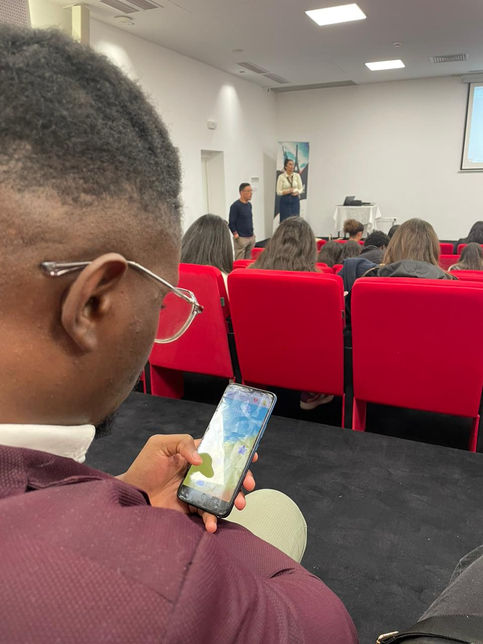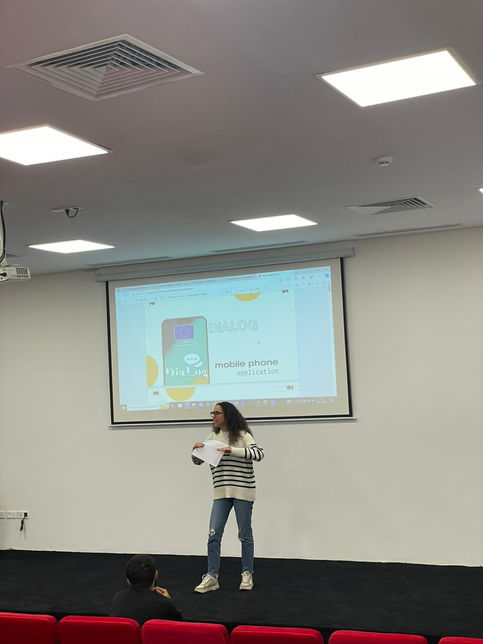
DiaLog
Ref: ERASMUS-YOUTH-2021-CB Project 101052031 — DiaLog


“Club for Youth Empowerment 018 (KOM 018), Serbia in cooperation with Beyond Borders – Italy, Council for Prevention of Juvenile Delinquency (SPPMD) – North Macedonia, Hellenic Youth Participation – Greece, Youth Spirit Center – Jordan, Youth Development Organization – Lebanon, Euro-Med EVE Maroc – Morocco and Euro-Med EVE – Tunisia would like to implement “DiaLog” project.
The project will bring together youth workers and young people from Program and Partner countries (Region 3) to explore methods in youth work and develop new forms of youth work for working on the issue of the intercultural dialogue and tolerance. The main need that this project wants to answer to is the lack of advanced intercultural working competencies and sensitivity in youth work field and especially of the ones active and working in international, multicultural, or global settings. Consortium would like to organize project for youth workers and young people from Program and Partner Countries (Region 3)who will, as multipliers gain specific education tools for an intercultural education.
Aim: To motivate youth workers and young people to take more active role in promotion of intercultural dialogue and tolerance. Specific objectives:
-
To increase the knowledge and competences of 24 youth workers from different continents in intercultural learning topics (culture, identity, prejudices, stereotypes, communication, intercultural dialogue)
-
To provide 24 youth workers with skills and knowledge to use graphics, photography and music as methods for the promotion of intercultural dialogue and tolerance.
-
To develop new educational tools – mobile app game - for understanding intercultural and human rights issues
-
To educate 24 youth workers and volunteers to plan and organize awareness raising campaign
-
To equip young people from European and non-European countries with different set of skills and tools to mobilize against hate speech and activate them to promote intercultural dialogue.
List of Participating Organisations
DiaLog – Kick Off Meeting
Club for Youth Empowerment 018 (KOM 018), Serbia in cooperation with Beyond Borders – Italy, Council for Prevention of Juvenile Delinquency (SPPMD) – North Macedonia, Hellenic Youth Participation – Greece, Youth Spirit Center – Jordan, Youth Development Organization – Lebanon, Euro-Med EVE Maroc – Morocco and Euro-Med EVE – Tunisia implements “DiaLog” project. The project brings together youth workers and young people from Program and Partner countries (Region 3) to explore methods in youth work and develop new forms of youth work for working on the issue of intercultural dialogue and tolerance. Consortium organizes “DiaLog” project for youth workers and young people from Greece, Jordan, Italy, Lebanon, Morocco, North Macedonia, Serbia and Tunisia who will gain specific skills and competences in the field of intercultural dialogue and tolerance through non-formal education and use of creative tools - concept graphics, photo and music; trained youth workers will test and multiply newly adopted competencies in their local communities among young people. Moreover, the project will deliver DiaLog mobile app – a game where young people can compete and learn more about intercultural dialogue and tolerance. Project is implemented in the period 01.02.2022 – 31.01.2024. and is co-financed by Erasmus Plus Program, EU - Capacity building in the field of youth (ERASMUS-YOUTH-2021-CB).
DiaLog – Training Course 01
-
Number of participants: 32 – youth workers, trainers and organizers.
-
Venue: Nis, Serbia.
-
Date: 21.05 - 28.05.2022.
The first Training Course was organized for youth workers and educators from 8 participating countries. 7 days long training empowered participants with knowledge and competences on the intercultural dialogue, on the problem of interethnic and inter-religious hate speech and how to use graphics, photography and music as the tools in the promotion of the same. The training was done through non-formal methods and combined of thematic workshops and creative workshops.
The Methods used was:
-
round-table discussions, presentations, working in groups, expectations, talking circles, brain storming, video clips and materials, study visit, team building, public speaking, outdoor activities, energizers etc.
-
Non-formal education / Learning to learn
-
participants learned more about non formal education as opposed to formal and discussed one of the key competences
-
learning to learn, how to define what they need to learn, how they learn best, learning styles, setting and planning learning
Following workshops was organized:
-
Introduction to the training course/ Introduction of the participants / Expectations and fears/Rules/ Team building
-
Non-formal education / Learning to learn
-
Inter-ethnic and inter-religious issues in the participating countries
-
Stereotypes, prejudices, discrimination
-
Understanding hate speech
-
Intercultural communication
-
Identity / Cultural Iceberg / Obstacles in intercultural communication
-
Sharing of good practices – Intercultural actions for young people in Europe
-
Dial Log game
-
Concept graphics, music and photography
Reporting groups
Graphic workshops - DiaLog - TC1
Photography workshops - DiaLog - TC1
Music workshops - DiaLog - TC1
DiaLog - Local Workshops
-
Number of participants: 10 – youth workers, trainers and organizers.
-
Venue: (tunisia, nabeul)
Day 1: Diagnosis. Evaluation of the dissemination of the activities: how to achieve a high level of involvement from each country community after the end of the project.
Day 2: Technical round table with relevant institutions to show the level of support towards the project, youth involvement.
Day 3: Evaluation. Meeting with Civil Society and Youth Associations
Day 4: Design of Follow up Strategy. Meeting with relevant stakeholders to present the strategy and register their feedback
Day 5: Presentation of the project outcomes with government institutions.
DiaLog - Evaluation Meeting
-
Number of participants: 15 – youth workers, trainers and organizers
-
Venue: Marrakech, Morocco.
-
Date: 03.02 - 05.02.2023.
OUR organization participated in the Evaluation meeting that gathered the project team to discuss operational and financial matters of the project and develop dynamics of the work plan.
In this meeting we evaluated the activities done in the first year of the project, lessons learned, the progress as we planned the 2nd year of the project.
DiaLog – Training Course 02
-
Number of participants: 32 – youth workers, trainers and organizers.
-
Venue: Bari, ITALY.
-
Date: 24.03 - 30.03.2023.
Training Course 2 will be organized for youth workers and educators from 8 participating countries. 7 days long training will include practical knowledge and skills in the organization of campaigns and how to present the topic of the campaign to the wider audience, development of cooperation with local stakeholders and how to raise the awareness about the importance of intercultural dialogue and tolerance. Additionally, mobile app game will be launched during the training and the participants will learn how to use it in the work with young people. Training that will involve youth workers and volunteers as well as trainers and organization team from participating countries. TC will be done through non-formal methods. Some of the methods will round-table discussions, presentations, working in groups, expectations, talking circles, brain storming, video clips and materials, team building, public speaking, outdoor activities, energizers etc.
Following workshops will be organized:
-
Introduction to the training course
-
Session: Presentation of the mobile application – educational game
-
Session: Planning of the DiaLog awareness campaigns
-
Session: Practical implementation: Model of the organization of an event within the campaign - concept development and creation of FB event, online promotion and reaching out through Facebook and Instagram
-
Session: Practical implementation – Model of the organization of an event within the campaign - development of promotional flyers
-
Session: Visit to possible stakeholders – NGOs, Municipality, schools/university and similar; Distribution of promo materials / Visits to media
-
DiaLog campaign event in the city
KOM 018 - Club for Youth Empowerment 018 / Klub za osnaživanje mladih 018 (KOM 018), Serbia in cooperation with Beyond Borders – Italy, SPPMD Council for Prevention of Juvenile Delinquency – North Macedonia, Hellenic Youth Participation – Greece, Youth Spirit Center - YSC – Jordan, YDO ME– Lebanon, Association Euro-Med EVE Morocco – Morocco and Association Euro-Med EVE Tunisia – Tunisia implements “DiaLog” project. The project brings together youth workers and young people from Program and Partner countries (Region 3) to explore methods in youth work and develop new forms of youth work for working on the issue of intercultural dialogue and tolerance. Consortium organizes “DiaLog” project for youth workers and young people from Greece, Jordan, Italy, Lebanon, Morocco, North Macedonia, Serbia and Tunisia who will gain specific skills and competences in the field of intercultural dialogue and tolerance through non-formal education and use of creative tools - concept graphics, photo and music; trained youth workers will test and multiply newly adopted competencies in their local communities among young people. Moreover, the project will deliver DiaLog mobile app – a game where young people can compete and learn more about intercultural dialogue and tolerance. Project is implemented in the period 01.02.2022 – 31.01.2024. and is co-financed by Erasmus Plus Program, EU - Capacity building in the field of youth (ERASMUS-YOUTH-2021-CB).

Activity with
lio club nabeul we celebrated international
youth day
Club for Youth Empowerment 018 (KOM 018), Serbia in cooperation with Beyond Borders – Italy, Council for Prevention of Juvenile Delinquency (SPPMD) – North Macedonia, Hellenic Youth Participation – Greece, Youth Spirit Center – Jordan, Youth Development Organization – Lebanon, Euro-Med EVE Maroc – Morocco and Euro-Med EVE – Tunisia implements “DiaLog” project. The project brings together youth workers and young people from Program and Partner countries (Region 3) to explore methods in youth work and develop new forms of youth work for working on the issue of intercultural dialogue and tolerance. Consortium organizes “DiaLog” project for youth workers and young people from Greece, Jordan, Italy, Lebanon, Morocco, North Macedonia, Serbia and Tunisia who will gain specific skills and competences in the field of intercultural dialogue and tolerance through non-formal education and use of creative tools - concept graphics, photo and music; trained youth workers will test and multiply newly adopted competencies in their local communities among young people. Moreover, the project will deliver DiaLog mobile app – a game where young people can compete and learn more about intercultural dialogue and tolerance. Project is implemented in the period 01.02.2022 – 31.01.2024. and is co-financed by Erasmus Plus Program, EU - Capacity building in the field of youth (ERASMUS-YOUTH-2021-CB).







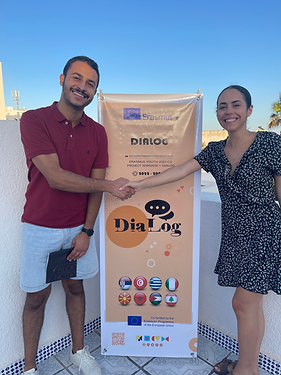

Image Gallery
Discovering the "Project Dialog" App on International Youth Day:
On International Youth Day, we embarked on a remarkable journey of discovery as we introduced the innovative "Project Dialog" app to empower and engage with the vibrant and dynamic youth community. This groundbreaking app, specially designed for and by young individuals, embodies the spirit of this global celebration of youth.
Celebrating Tolerance International Day
Tolerance International Day is a momentous occasion that encourages communities worldwide to embrace diversity, foster understanding, and promote a culture of respect and acceptance. In Darchabeen Nabeul, this day serves as an opportunity to bring together the vibrant youth community and engage in activities that celebrate the richness of diversity. One such initiative involves organizing a local event at the House of Youth, where young individuals can actively participate in fostering tolerance and unity.

app competition
Get Inspired
Final Evaluation
We present to you photos from the final conference of the project "DiaLog".
If you still haven't, install the DiaLog quiz - increase knowledge about the issues of intercultural and inter-religious dialogue, tolerance, and human rights in general while having fun! - https://play.google.com/store/apps/details...
Club for Youth Empowerment 018 (KOM 018), Serbia in cooperation with Beyond Borders Italy – Italy, SPPMD Council for Prevention of Juvenile Delinquency (SPPMD) – North Macedonia, Hellenic Youth Participation – Greece, Youth Spirit Center - YSC – Jordan, YOUTH Development Organization – Lebanon, Association Euro-Med EVE Morocco – Morocco and Association Euro-Med EVE Tunisia – Tunisia implements “DiaLog” project. The project brings together youth workers and young people from Program and Partner countries (Region 3) to explore methods in youth work and develop new forms of youth work for working on the issue of intercultural dialogue and tolerance. Consortium organizes “DiaLog” project for youth workers and young people from Greece, Jordan, Italy, Lebanon, Morocco, North Macedonia, Serbia and Tunisia who will gain specific skills and competences in the field of intercultural dialogue and tolerance through non-formal education and use of creative tools - concept graphics, photo and music; trained youth workers will test and multiply newly adopted competencies in their local communities among young people. Moreover, the project will deliver DiaLog mobile app – a game where young people can compete and learn more about intercultural dialogue and tolerance. Project is implemented in the period 01.02.2022 – 31.01.2024. and is co-financed by Erasmus Plus Program, EU - Capacity building in the field of youth (ERASMUS-YOUTH-2021-CB).


















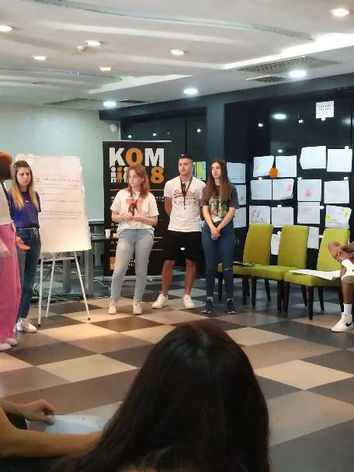






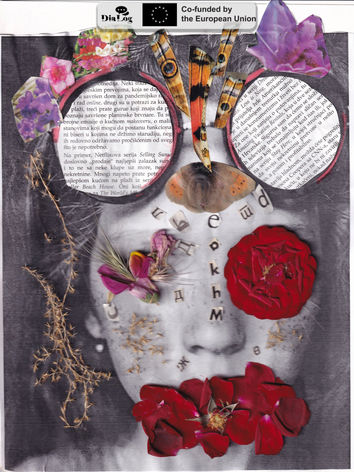














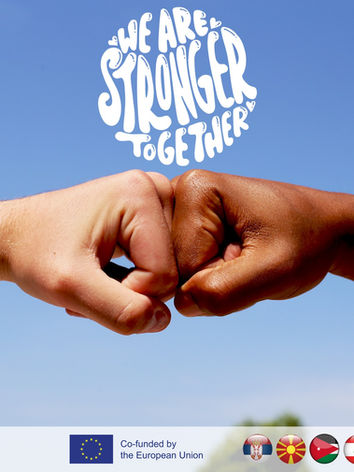























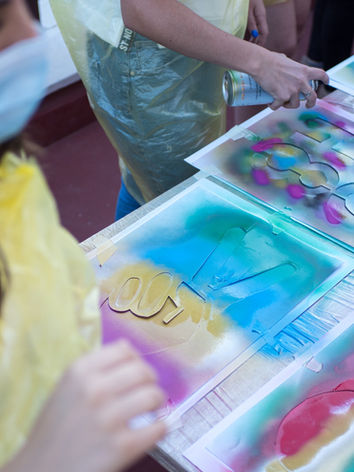





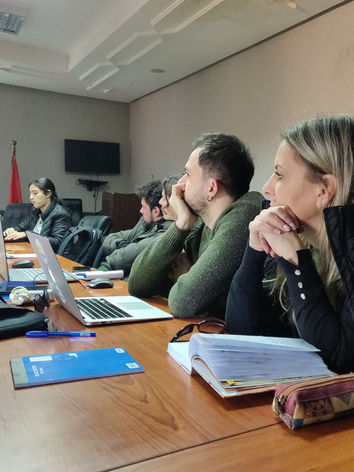










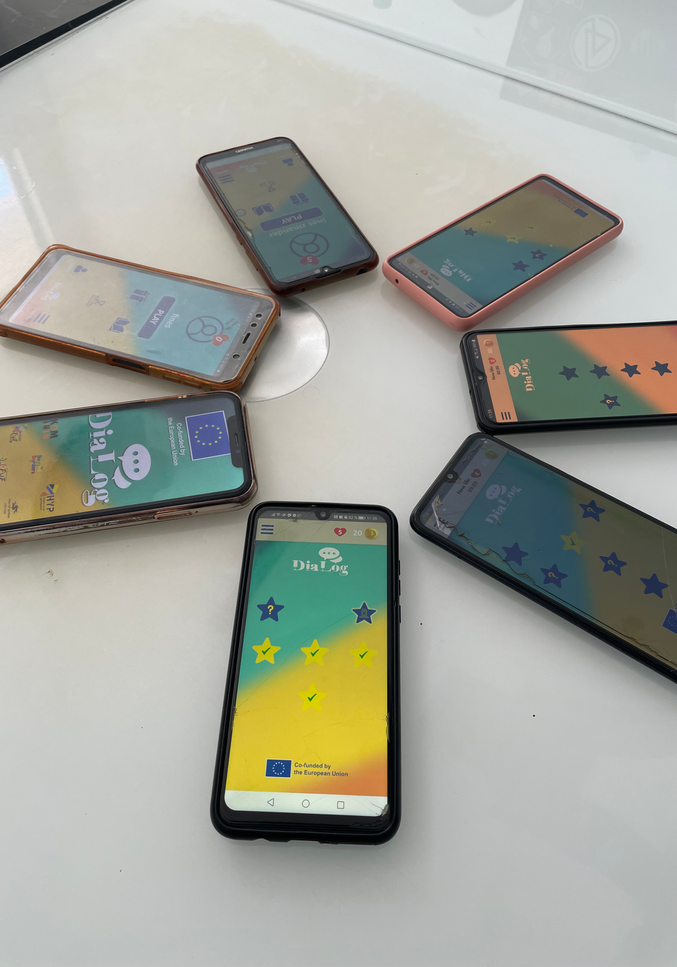

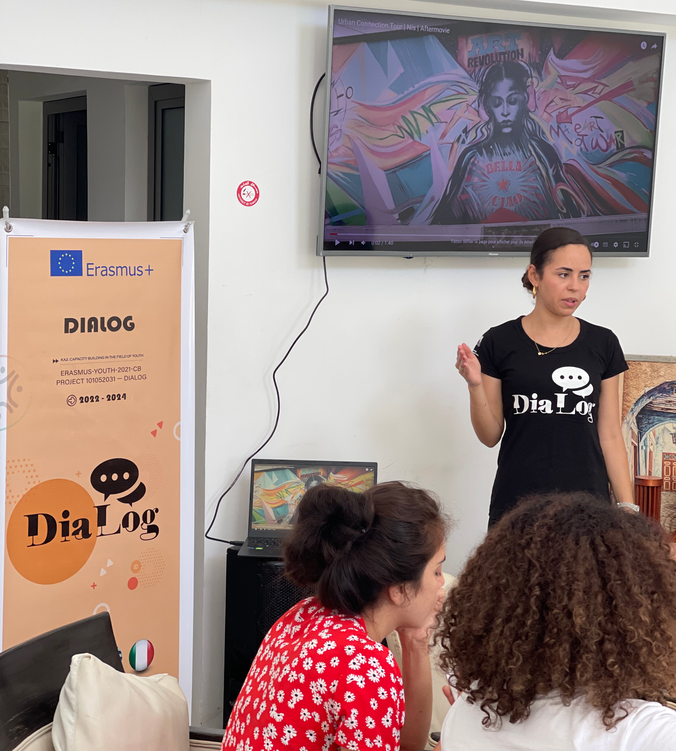



_svg.png)











